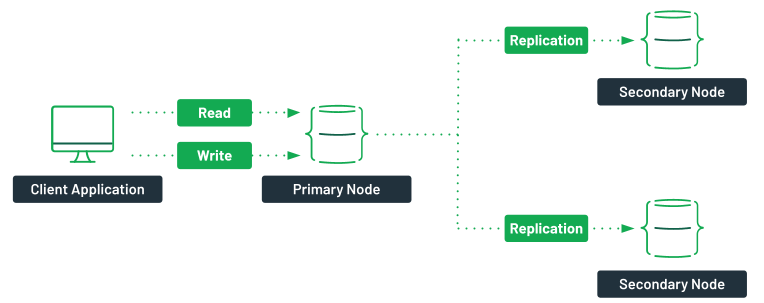MongoDB Series - ReplicaSet Cluster Deployment

Environment Introduction⌗
- Multipass VMs
- mongo:latest
For an introduction to Multipass, you can check my other article “Cross-platform Ubuntu VMs Management Tool”.

Installing Nodes⌗
multipass launch docker --name cluster-01 --disk 40G --cpus 2 --mem 4G
multipass launch docker --name cluster-02 --disk 40G --cpus 2 --mem 4G
multipass launch docker --name cluster-03 --disk 40G --cpus 2 --mem 4G
Name State IPv4 Image
cluster-01 Running 10.0.8.4 Ubuntu 22.04 LTS
172.17.0.1
cluster-02 Running 10.0.8.5 Ubuntu 22.04 LTS
172.17.0.1
cluster-03 Running 10.0.8.6 Ubuntu 22.04 LTS
172.17.0.1
As we can see, after the virtual machines are deployed, their IPs are 10.0.8.4, 10.0.8.5, and 10.0.8.6 respectively.
Getting the Latest MongoDB Image⌗
Pull the latest Docker image of MongoDB on each node:
docker pull mongo:latest
Starting MongoDB Nodes⌗
multipass shell cluster-01
docker run -d --name mongodb --net host mongo:latest mongod --replSet betterde --bind_ip 10.0.8.4
multipass shell cluster-02
docker run -d --name mongodb --net host mongo:latest mongod --replSet betterde --bind_ip 10.0.8.5
multipass shell cluster-03
docker run -d --name mongodb --net host mongo:latest mongod --replSet betterde --bind_ip 10.0.8.6
–replSet specifies the name of the ReplicaSet, and starts the corresponding mongod service on each of the three VMs.
Initializing the ReplicaSet⌗
# Login to the VM node
multipass shell cluster-01
# Enter the MongoDB container
docker exec -it mongodb bash
# Connect to the MongoDB database using mongosh
mongosh
# Initialize the ReplicaSet
rs.initiate()
# Add nodes
rs.add("10.0.8.5:27017")
rs.add("10.0.8.6:27017")
If everything goes well, the cluster setup is complete. We can use the following command to check the cluster status:
rs.status();
{
set: 'betterde',
date: ISODate("2022-10-17T10:21:08.985Z"),
myState: 1,
term: Long("1"),
syncSourceHost: '',
syncSourceId: -1,
heartbeatIntervalMillis: Long("2000"),
majorityVoteCount: 2,
writeMajorityCount: 2,
votingMembersCount: 3,
writableVotingMembersCount: 3,
optimes: {
lastCommittedOpTime: { ts: Timestamp({ t: 1666002061, i: 1 }), t: Long("1") },
lastCommittedWallTime: ISODate("2022-10-17T10:21:01.056Z"),
readConcernMajorityOpTime: { ts: Timestamp({ t: 1666002061, i: 1 }), t: Long("1") },
appliedOpTime: { ts: Timestamp({ t: 1666002061, i: 1 }), t: Long("1") },
durableOpTime: { ts: Timestamp({ t: 1666002061, i: 1 }), t: Long("1") },
lastAppliedWallTime: ISODate("2022-10-17T10:21:01.056Z"),
lastDurableWallTime: ISODate("2022-10-17T10:21:01.056Z")
},
lastStableRecoveryTimestamp: Timestamp({ t: 1666002061, i: 1 }),
electionCandidateMetrics: {
lastElectionReason: 'electionTimeout',
lastElectionDate: ISODate("2022-10-17T09:47:06.626Z"),
electionTerm: Long("1"),
lastCommittedOpTimeAtElection: { ts: Timestamp({ t: 1666000026, i: 1 }), t: Long("-1") },
lastSeenOpTimeAtElection: { ts: Timestamp({ t: 1666000026, i: 1 }), t: Long("-1") },
numVotesNeeded: 1,
priorityAtElection: 1,
electionTimeoutMillis: Long("10000"),
newTermStartDate: ISODate("2022-10-17T09:47:06.643Z"),
wMajorityWriteAvailabilityDate: ISODate("2022-10-17T09:47:06.655Z")
},
members: [
{
_id: 0,
name: '10.0.8.4:27017',
health: 1,
state: 1,
stateStr: 'PRIMARY',
uptime: 2200,
optime: { ts: Timestamp({ t: 1666002061, i: 1 }), t: Long("1") },
optimeDate: ISODate("2022-10-17T10:21:01.000Z"),
lastAppliedWallTime: ISODate("2022-10-17T10:21:01.056Z"),
lastDurableWallTime: ISODate("2022-10-17T10:21:01.056Z"),
syncSourceHost: '',
syncSourceId: -1,
infoMessage: '',
electionTime: Timestamp({ t: 1666000026, i: 2 }),
electionDate: ISODate("2022-10-17T09:47:06.000Z"),
configVersion: 6,
configTerm: 1,
self: true,
lastHeartbeatMessage: ''
},
{
_id: 1,
name: '10.0.8.5:27017',
health: 1,
state: 2,
stateStr: 'SECONDARY',
uptime: 2006,
optime: { ts: Timestamp({ t: 1666002061, i: 1 }), t: Long("1") },
optimeDurable: { ts: Timestamp({ t: 1666002061, i: 1 }), t: Long("1") },
optimeDate: ISODate("2022-10-17T10:21:01.000Z"),
optimeDurableDate: ISODate("2022-10-17T10:21:01.000Z"),
lastAppliedWallTime: ISODate("2022-10-17T10:21:01.056Z"),
lastDurableWallTime: ISODate("2022-10-17T10:21:01.056Z"),
lastHeartbeat: ISODate("2022-10-17T10:21:08.915Z"),
lastHeartbeatRecv: ISODate("2022-10-17T10:21:08.916Z"),
pingMs: Long("2"),
lastHeartbeatMessage: '',
syncSourceHost: '10.0.8.4:27017',
syncSourceId: 0,
infoMessage: '',
configVersion: 6,
configTerm: 1
},
{
_id: 2,
name: '10.0.8.6:27017',
health: 1,
state: 2,
stateStr: 'SECONDARY',
uptime: 2001,
optime: { ts: Timestamp({ t: 1666002061, i: 1 }), t: Long("1") },
optimeDurable: { ts: Timestamp({ t: 1666002061, i: 1 }), t: Long("1") },
optimeDate: ISODate("2022-10-17T10:21:01.000Z"),
optimeDurableDate: ISODate("2022-10-17T10:21:01.000Z"),
lastAppliedWallTime: ISODate("2022-10-17T10:21:01.056Z"),
lastDurableWallTime: ISODate("2022-10-17T10:21:01.056Z"),
lastHeartbeat: ISODate("2022-10-17T10:21:08.915Z"),
lastHeartbeatRecv: ISODate("2022-10-17T10:21:08.912Z"),
pingMs: Long("2"),
lastHeartbeatMessage: '',
syncSourceHost: '10.0.8.4:27017',
syncSourceId: 0,
infoMessage: '',
configVersion: 6,
configTerm: 1
}
],
ok: 1,
'$clusterTime': {
clusterTime: Timestamp({ t: 1666002061, i: 1 }),
signature: {
hash: Binary(Buffer.from("0000000000000000000000000000000000000000", "hex"), 0),
keyId: Long("0")
}
},
operationTime: Timestamp({ t: 1666002061, i: 1 })
}
Using the rs.status() command, we can see that all three nodes in the cluster are now running normally.
I hope this is helpful, Happy hacking…